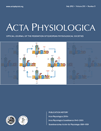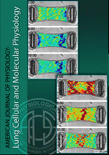
JOURNAL OF PHYSIOLOGY-LONDON
Scope & Guideline
Championing Excellence in Physiological Research
Introduction
Aims and Scopes
- Physiological Mechanisms:
Research exploring the mechanisms underlying physiological processes in various systems, including cardiovascular, respiratory, and neuromuscular physiology. - Cellular and Molecular Physiology:
Studies that investigate cellular signaling pathways, ion channel function, and molecular interactions affecting physiological functions. - Integrative Physiology:
Research focusing on the integration of physiological systems and their responses to external and internal stimuli, including exercise, hypoxia, and pharmacological interventions. - Translational Physiology:
Investigations aimed at translating basic physiological research into clinical applications, particularly in the context of disease mechanisms and therapeutic strategies. - Comparative Physiology:
Studies comparing physiological processes across species to understand evolutionary adaptations and functional diversity.
Trending and Emerging
- Neurophysiology and Neuroplasticity:
An increasing focus on how neural circuits adapt and reorganize in response to various stimuli, including learning, injury, and rehabilitation. - Microphysiology and Organoids:
Research utilizing microphysiological systems and organoid models to study human physiology and disease mechanisms in a controlled environment. - Metabolic Health and Disease:
A growing interest in the physiological mechanisms underlying metabolic disorders, with a focus on exercise, nutrition, and pharmacological interventions. - Environmental Physiology:
Research addressing the physiological adaptations to environmental stressors such as high altitude, hypoxia, and climate change, reflecting the growing awareness of global health challenges. - Personalized Medicine Approaches:
The emergence of studies aimed at understanding individual variability in physiological responses to interventions, promoting tailored therapeutic strategies.
Declining or Waning
- Traditional Exercise Physiology:
Research specifically focused on traditional metrics of exercise physiology, such as VO2 max, is becoming less central as newer methodologies and interdisciplinary approaches gain traction. - Basic Reflex Studies:
Studies exclusively examining basic reflex pathways without integrating more complex behavioral and environmental contexts are appearing less frequently. - Invasive Physiological Techniques:
The use of invasive techniques in human studies is declining, with a shift towards non-invasive and less intrusive methodologies that respect patient safety and comfort. - Static Models of Physiological Systems:
Static models that do not account for dynamic physiological changes and interactions are being replaced by more comprehensive, dynamic modeling approaches.
Similar Journals

RESPIRATORY PHYSIOLOGY & NEUROBIOLOGY
Innovating Research at the Intersection of Physiology and NeurobiologyRESPIRATORY PHYSIOLOGY & NEUROBIOLOGY, published by Elsevier, is a prominent journal in the fields of respiratory medicine, neurobiology, and physiology. With an ISSN of 1569-9048 and E-ISSN 1878-1519, this journal serves as an essential platform for disseminating high-quality original research and reviews that explore the intricate relationships between respiratory function and neural controls. Located in the Netherlands, it boasts an impressive standing within its field, categorically placed in the Q3 quartile for Neuroscience and Physiology and Q2 for Pulmonary and Respiratory Medicine according to the 2023 metrics. With a Scopus rank of #58 in Pulmonary and Respiratory Medicine and a robust impact factor indicative of its academic influence, the journal aims to foster advancement in understanding the physiological and neurobiological aspects of respiration. Although the journal is not open access, its content is vital for researchers, professionals, and students eager to contribute to the expanding knowledge base in these critical scientific domains.

CHINESE JOURNAL OF PHYSIOLOGY
Unveiling the complexities of human biology.CHINESE JOURNAL OF PHYSIOLOGY, published by WOLTERS KLUWER MEDKNOW PUBLICATIONS, has been a vital resource since its inception in 1971, catering to the expansive field of physiology. Operating out of Taiwan, this journal addresses critical research in both general and medical physiology, providing a platform for innovative studies that contribute significantly to the understanding of biological processes. With an emphasis on disseminating high-quality, peer-reviewed articles, it holds a Q4 ranking in Physiology and a Q3 ranking in Medical Physiology as of 2023, reflecting its commitment to advancing physiological science. The ISSN for this journal is 0304-4920 and the E-ISSN is 2666-0059. While access options are not available as open access, researchers and professionals can still benefit from its valuable insights. Notably, it ranks #78/113 in Medicine - Physiology and #159/193 in Biochemistry, Genetics, and Molecular Biology - Physiology on Scopus, indicating its growing influence in the scientific community. We invite researchers, professionals, and students alike to explore the wealth of knowledge featured within the pages of the CHINESE JOURNAL OF PHYSIOLOGY.

JOURNAL OF EVOLUTIONARY BIOCHEMISTRY AND PHYSIOLOGY
Unraveling the Secrets of Life Through Evolutionary InsightsJOURNAL OF EVOLUTIONARY BIOCHEMISTRY AND PHYSIOLOGY, published by PLEIADES PUBLISHING INC, is a pivotal periodical that delves into the intricate relationships between biochemical processes and evolutionary dynamics. With its ISSN 0022-0930 and E-ISSN 1608-3202, this journal serves as a comprehensive platform for researchers, professionals, and students dedicated to understanding the physiological adaptations and biochemical mechanisms influenced by evolutionary pressures. Although it is not an open access journal, it offers valuable insights across its historically significant coverage spanning from 1972 to 2017, making it an essential resource for those working in agricultural, biological, and molecular sciences. Despite its current Scopus rankings revealing limited visibility within its fields, the journal remains committed to fostering scholarly dialogue and advancing knowledge in the realm of evolutionary biochemistry, especially for those exploring the ecological, genetic, and integrative physiological aspects of life.

Physiology International
Empowering Knowledge in Physiology and WellnessPhysiology International is a distinguished journal dedicated to the exploration and advancement of knowledge in the fields of physiology, sports medicine, and rehabilitation. Published by AKADEMIAI KIADO ZRT in Hungary, this open-access journal has been a reliable source of scholarly articles since its inception in 2016, providing valuable insights into both complementary and alternative medicine, as well as traditional medical practices. With an impact factor that situates it in Q2 and Q3 quartiles across related disciplines, including Physical Therapy, Sports Therapy and Rehabilitation and Orthopedics and Sports Medicine, it represents a vital resource for professionals and researchers looking to stay abreast of the latest findings and methodologies. The journal is indexed on Scopus, signifying its credibility and relevance in the medical community. As it continues to develop through 2024, Physiology International invites contributions that challenge existing paradigms and foster innovative approaches to health and wellness, making it an essential platform for advancing the conversation in medical physiology and its applications.

Acta Physiologica
Connecting Researchers through Open Access KnowledgeActa Physiologica is a premier, peer-reviewed journal published by WILEY, dedicated to the dissemination of high-quality research across the field of physiology. With an impressive impact factor reflective of its Q1 category ranking in Physiology for 2023, this journal is a vital resource for researchers, professionals, and students alike, seeking to explore the complexities of biological systems. The journal is indexed with a commendable Scopus rank of #18 out of 193 in its category, placing it within the top 10% of its field, which underscores its influence and citation frequency within the academic community. Acta Physiologica publishes a variety of articles that address fundamental physiological concepts, innovative methodologies, and cross-disciplinary research. With its open access options, the journal ensures that cutting-edge knowledge is readily accessible, fostering an environment of collaboration and advancement in the study of physiology. Spanning from 2006 to 2024, the journal continues to be at the forefront of physiological research and education, encouraging the global sharing of knowledge through its comprehensive content.

AMERICAN JOURNAL OF PHYSIOLOGY-CELL PHYSIOLOGY
Shaping the Future of Cell Physiology Through Rigorous Research.Welcome to the American Journal of Physiology-Cell Physiology, a premier publication produced by the American Physiological Society that has been a cornerstone of research in cell biology and physiology since its inception in 1977. With its esteemed reputation solidified by its Q1 ranking in both Cell Biology and Physiology categories as of 2023, this journal serves as a vital resource for researchers, professionals, and students pursuing cutting-edge discoveries in cellular mechanisms. The journal is published in the United States and is recognized for its rigorous peer-review process, contributing to its high impact factor and prestigious standing—ranking #32 out of 193 in Physiology and #75 out of 285 in Cell Biology according to Scopus. While the journal does not provide open access, it remains an essential repository of knowledge, fostering innovation and advancing the field with original research articles, reviews, and commentaries. Join us in exploring the molecular intricacies of life through the compelling research that the American Journal of Physiology-Cell Physiology has to offer.

COMPARATIVE BIOCHEMISTRY AND PHYSIOLOGY A-MOLECULAR & INTEGRATIVE PHYSIOLOGY
Exploring Cutting-edge Research in Comparative Physiology.Comparative Biochemistry and Physiology A-Molecular & Integrative Physiology, published by Elsevier Science Inc, serves as a pivotal platform for cutting-edge research in the fields of biochemistry, physiology, and animal sciences. The journal, holding an esteemed presence with an ISSN of 1095-6433 and E-ISSN 1531-4332, spans a remarkable history of contributions since its inception in 1960, showcasing significant findings up to 2024. As a Q1 quartile journal in Animal Science and Zoology and featuring competitive rankings across various biochemistry and physiology disciplines, it stands out as a leading resource for both established researchers and emerging scholars alike. The journal is committed to publishing high-quality, peer-reviewed articles that deepen our understanding of molecular and integrative physiology, playing an essential role in advancing scientific knowledge and fostering interdisciplinary collaboration. With access options that prioritize the dissemination of impactful research, Comparative Biochemistry and Physiology continues to shape the dialogue within these dynamic fields.

PFLUGERS ARCHIV-EUROPEAN JOURNAL OF PHYSIOLOGY
Fostering Insights in Clinical and Medical PhysiologyPflügers Archiv - European Journal of Physiology, published by Springer Heidelberg, stands at the forefront of physiological research, showcasing groundbreaking studies since its inception in the 1950s. With a distinguished ISSN of 0031-6768 and an E-ISSN of 1432-2013, this esteemed journal maintains a robust reputation, holding Q1 rankings in Clinical Biochemistry, Physiology, and Medical Physiology as of 2023. Its impressive Scopus rankings place it in the top percentile across various categories, including Biochemistry, Genetics and Molecular Biology and Medicine. Pflügers Archiv serves as a vital platform for researchers, professionals, and students, facilitating the dissemination and discussion of advanced physiological concepts and methodologies. Although it does not currently offer open access, its rigorous peer-review process ensures the highest quality publications that contribute significantly to our understanding of physiological science. Explore the depth of physiological research that shapes our academic landscape today.

PHYSIOLOGICAL AND BIOCHEMICAL ZOOLOGY
Exploring the Depths of Animal LifePhysiological and Biochemical Zoology is a distinguished peer-reviewed journal published by University of Chicago Press, focusing on the interrelated fields of animal physiology, biochemistry, and zoology. With a strong commitment to advancing scientific understanding, this journal serves as a vital resource for researchers, professionals, and students alike, providing a platform for the latest findings and advancements in the field. Ranking in the top quartile (Q1) in Animal Science and Zoology as of 2023, and showcasing a substantial convergence of historical data from 1999 to 2023, its impact in the academic community is underscored by its engagement with high-quality research. While it also appears in the third quartile for Biochemistry and Physiology, the journal successfully integrates these disciplines, reflecting the complexity of biological systems. Available for reading via various access options, this journal is essential for anyone seeking to deepen their knowledge or contribute to the field of Zoological sciences.

AMERICAN JOURNAL OF PHYSIOLOGY-LUNG CELLULAR AND MOLECULAR PHYSIOLOGY
Advancing pulmonary science through rigorous research.AMERICAN JOURNAL OF PHYSIOLOGY-LUNG CELLULAR AND MOLECULAR PHYSIOLOGY, published by the American Physiological Society, stands as a prominent peer-reviewed journal dedicated to advancing the field of lung cellular and molecular physiology. With an impressive impact factor, the journal serves as a crucial platform for disseminating high-quality research focused on the intricate mechanisms underlying pulmonary function and disease. Established in 1989, this journal has consistently ranked within the top quartiles across various categories, including Q1 in Physiology and Pulmonary and Respiratory Medicine, highlighting its significance in the scientific community. The journal covers a wide scope of topics pertinent to cell biology and physiology, catering to the needs of researchers, professionals, and students seeking to explore and contribute to this vital area of study. Although currently not offering open access, it provides comprehensive access options for subscribers, ensuring that vital research is communicated effectively to the global scientific community. With a commitment to fostering innovation and inspiring future studies, the AMERICAN JOURNAL OF PHYSIOLOGY-LUNG CELLULAR AND MOLECULAR PHYSIOLOGY remains an essential resource for those engaged in lung research.